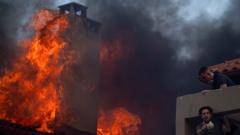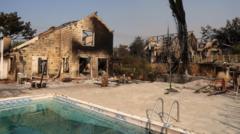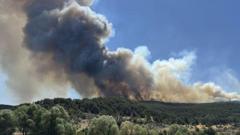A major heatwave affecting over 160 million people in eastern North America has resulted in numerous hospitalizations due to heat-related illnesses. As cities declare states of emergency, experts caution about the health risks associated with the extreme conditions.
Record-Breaking Heatwave Grips Eastern North America, Leading to Hospitalizations

Record-Breaking Heatwave Grips Eastern North America, Leading to Hospitalizations
As a historic heatwave sweeps through eastern North America, health officials report a surge in heat-related illnesses, with dozens hospitalized amidst unprecedented temperatures.
A significant heatwave has enveloped eastern North America, leading to alarming health concerns as dozens of individuals have been hospitalized for heat-related ailments. The first major wave of summer heat arrived with a ferocity, affecting areas from the Midwest to the East Coast, and extending into parts of Canada, where more than 160 million people are forecasted to endure extreme temperatures throughout the week.
In Paterson, New Jersey, over 150 attendees at an outdoor school graduation ceremony fell ill, prompting the mayor to declare a state of emergency. Reports describe the incident as a "mass casualty," with graduation events subsequently canceled. Similarly, during a concert in Washington DC featuring the popular South Korean band 'Stray Kids', several people required medical attention due to the oppressive heat.
Farther south, in North Carolina, at least 41 individuals, including children, sought medical treatment for heat-related injuries. Local authorities have issued heat warnings, emphasizing the risks of heat exhaustion and heat stroke, particularly due to the high humidity and unusually prolonged nature of this heat wave.
Health experts have indicated that cities could face temperatures exceeding historical June records, with projections for New York nearing 101°F (38°C), which would tie the city's highest June temperature recorded since 1966.
With the summer season officially starting just days ago, the NWS urges residents to stay hydrated, avoid sun exposure during peak hours, and check in on vulnerable community members such as the elderly.
Energy companies are on high alert for potential blackouts as millions ramp up their air conditioning usage to cope with the escalating temperatures. In light of this scenario, authorities continue to monitor the ongoing situation, reminding the public to take necessary precautions against this dangerous heatwave.























